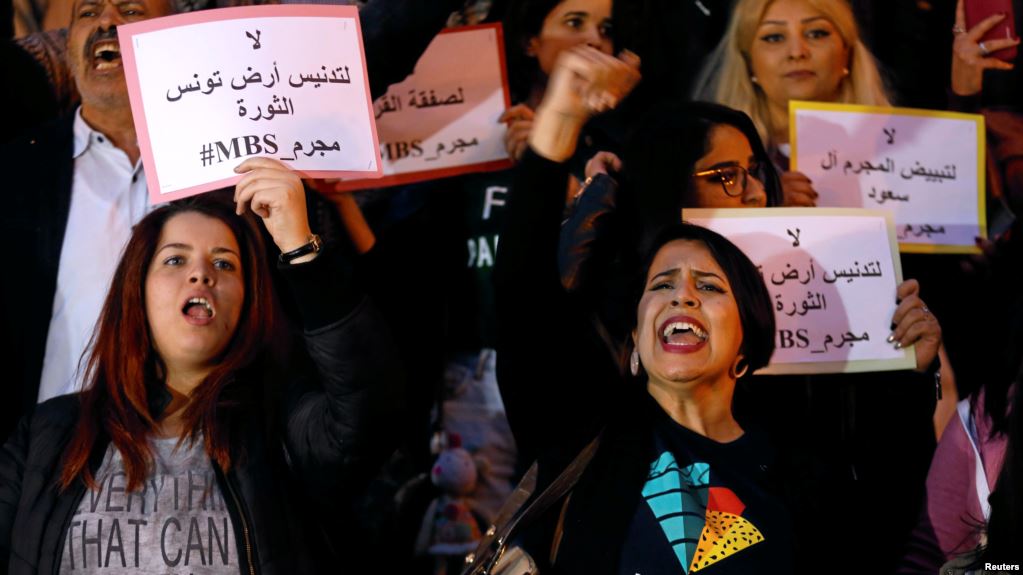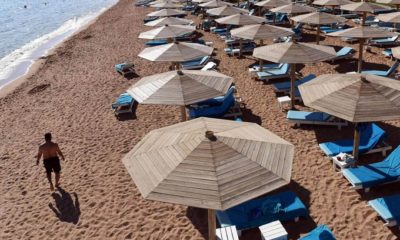- Tunisians in Second Day of Protest Against Saudi’s Prince Salman
Tunisians for the second day staged protests against Saudi Arabia’s Crown Prince, denouncing the kingdom’s de facto ruler as a murderer involved in the killing of Saudi journalist Jamal Khashoggi.
The protests were a rare occurrence for Crown Prince Mohammed bin Salman who faces no overt criticism at home and who received a lavish reception earlier in his tour in visits to Bahrain, the United Arab Emirates and Egypt.
Since the 2011 “Arab spring” uprising, which unseated entrenched rulers in the region and triggered turmoil, Tunisia has undergone a democratic transition and is one of the few Arab countries to allow protests.
Hundreds of protesters marched through the central Habib Bourguiba avenue in Tunis, scene of the mass protests that toppled the country’s Zine El Abidine Ben Ali in 2011, on the second day of demonstrations against the Saudi prince who was expected to arrive in late afternoon.
They chanted “the murderer is not welcome in Tunisia” and “Shame on Tunisia’s rulers” for receiving bin Salman.
The killing of Khashoggi, a Washington Post columnist and a critic of the crown prince, at Riyadh’s consulate in Istanbul six weeks ago has strained Saudi Arabia’s ties with the West and battered Prince Mohammed’s image abroad.
Saudi Arabia has said the prince, heir to the throne of the world’s top oil exporter, had no prior knowledge of the murder.
After offering numerous contradictory explanations, Riyadh said last month that Khashoggi had been killed and his body dismembered when negotiations to persuade him to return to Saudi Arabia failed.
Protesters raised a large poster which depicted the Tunisian president pouring water on the bloodied hands of the Saudi crown prince – suggesting Tunisia’s complicity in washing away guilt.
Protesters also called for an end to the Saudi-led military campaign in neighbouring Yemen, which was launched by Prince Mohammed in his role as defence minister in 2015.
The protests were in sharp contrast with earlier parts of his tour of allied countries in the region.
Egypt’s President Abdel Fattah al-Sisi underscored the strength of ties between the two countries, and called Saudia Arabia’s security and stability “an inseparable part of Egypt’s national security.”
Journalists on Monday put up a huge banner at their union showing the prince with a saw, which Turkish sources have said was used to dismember Khashoggi in Istanbul. It read: “No to the pollution of the Tunisian revolution.”
Dozens of Tunisian rights activists and journalists staged a similar protest on Monday.
In an apparent attempt to avoid embarrassing the prince, the presidency only invited photographers to cover his visit. It will not hold a news conference, a usual event at top visits.
Last week Nourredine Ben Ticha, adviser to Tunisia’s President Beji Caid Essebsi, said the truth about the killing of the Saudi journalist needed to be established but the incident should not be used to harm the kingdom’s stability.
Tunisia and Saudi Arabia are very different political systems. The kingdom is an absolute monarchy while Tunisia has been holding free elections since 2011 and agreed three years later on a constitution guaranteeing fundamental rights.
Tunisia was a strong Saudi ally under Ben Ali but ties have since been strained at times. The kingdom granted exile to Ben Ali who flew to Jeddah on the Red Sea after his ousting, resisting calls by some Tunisian parties to hand him over.
Another irritant is that moderate Islamists have been sharing power with secularists in Tunisia since 2011. Some critics have likened the Tunisian Ennahda party to the Muslim Brotherhood, which is banned in Saudi Arabia.
In contrast, Tunisia has since 2011 expanded cooperation with Qatar, with which Saudi Arabia and three other Arab states severed trade and transport ties in June 2017. The four accused Doha of supporting terrorism and Iran — charges Doha denies.
Tunisia also has strong ties with Turkey, whose relations with Saudi Arabia have been strained by the Khashoggi killing.
The prince is expected to fly on to a G20 summit in Argentina at the end of his Tunisia visit.


 Forex2 weeks ago
Forex2 weeks ago


 Naira2 weeks ago
Naira2 weeks ago
 Naira4 weeks ago
Naira4 weeks ago
 Company News4 weeks ago
Company News4 weeks ago
 Billionaire Watch1 week ago
Billionaire Watch1 week ago




 Naira2 weeks ago
Naira2 weeks ago




 Naira1 week ago
Naira1 week ago




 Naira4 weeks ago
Naira4 weeks ago





















